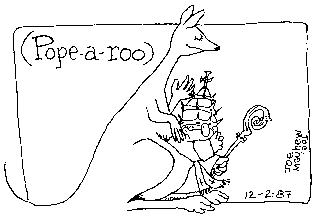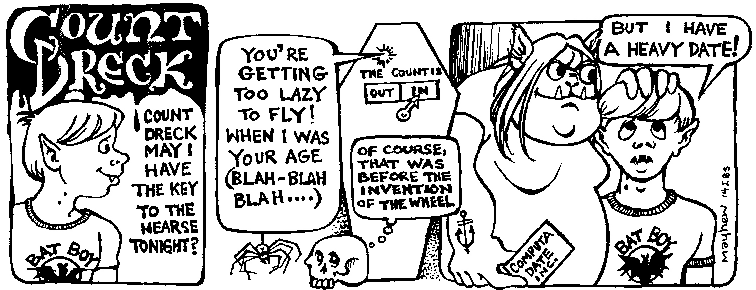

----------------------------------------------------------------------

NOVEMBER 20, 1987
At Bloom/Morman House. Mike Walsh presiding, Erica Van Dommelen reporting (Joe was off at SMOFCON).
The meeting was called to order at 9:13. The minutes of the previous meetings were available in the JOURNAL, but were not reported. The Treasurer reported, "Arf! $15,483.45"
COMMITTEE REPORTS:
POKER TABLE: NEWS! Sears has accepted the order. We will have them for the Solstice Dinner. Only one is back-ordered.
DISCON III: Help is needed to clean up the mailing list. They had two parties at Philcon: Orlando wasn't there. There was also a party at SciCon.
ENTERTAINMENT: 3rd Friday will be at Gillilands and the Solstice Dinner will be the next day. Call Doll to tell her what you will bring.
DISCLAVE'88: Memberships go up after the first of the year. BUY NOW!
DISCLAVE'89: Mike will be calling some new hotels early next year. If the Con moves it will be for the benefit of the DISCLAVE, not DISCON, as Disclave happens every year.
NO BUSINESS WAS ACCOMPLISHED. (Mary Morman tried to get everyone to count off for the beverage estimate, but it appeared that WSFAns can't count.
Adjourned at 9:30.
ADDRESS CORRECTIONS:
Kim Elmore's street address is:
[censored]
Keith Olson / Ginny McNitt
[censored]
Arlington, VA 22201
(703) 525-5473
Joe Haldeman gave a reading on December 3rd at 3:30 in the Katherine Ann Porter Room of the McKeldin Library, U of Md (his Alma Mater).

(Charlotte Spivack. MERLIN'S DAUGHTERS, c1987, from Greenwood Press, New York and Westport, Conn. 185 p. bib., index. ISBN 0-313-24194-5: $29.95)
Spivack, a professor of English at the University of Massachusetts, presents a discussion of "ten representative Female fantasists," viewing their work as a "female point of view on conventionally masculine subjects" (e.g.: the quest; seeking and use of power; in western literature especially, strict dualism of values to the exclusion of ambiguity and balance). Some, but not all of the authors here use the Arthurian mythos and various Celtic legends; all have female protagonists as well as male, and where the chief characters are male they are not "typical".
Her introductory essay, "Fantasy and the Feminine", is worth reading in itself for the general discussion of fantasy themes and the ideas she finds in the ten authors in particular. She sees these authors as modifying the genre by developing new views of the fantasy quest, of heroes, of the fantasy world, and of the meaning of magic in fantasy. In the Individual essays she goes into much more detail, of course, including discussion of contrasts between traditional attitudes and points of view and those presented in the novels. A VERY brief survey of several other current authors follows the main text, with four pages of footnotes (primarily for "Fantasy and the Feminine" and Ursula K. LeGuin, graphically demonstrates the scarcity of critical attention paid to these writers even within the field). There is also a bibliography of primary and the few secondary sources for the main ten authors plus several in the brief survey.
The authors discussed are Andre Norton (The Witch World series and related titles, as well as a series of Juveniles which Spivack refers to as the 'Magic Series'). Susan Cooper (the five book DARK IS RISING sequence). Ursula K. LeGuin (the EARTHSEA Trilogy). Evangeline Walton (The four volume treatment of the Mabinogion). Katherine Kurtz (the DERNYI series through CAMBER, THE HERETIC); Patricia McKillip (FORGOTTEN BEASTS OF ELD and the RIDDLEMAN trilogy); Vera Chapman (The THREE DAMOSELS trilogy); Gillian Bradshaw (HAWK OF MAY, KINGDOM OF SUMMER, and IN WINTER'S SHADOW, a trilogy): Marion Zimmer Bradley (MISTS OF AVALON).
I'm personally very fond of the Cooper, McKillip, Stewart and Bradley books, and find Spivack's discussion of themes and characters fascinating. It's been too, too long since I read the Earthsea or Damosels, but from what I remember of those books, she reviews them very worthily. I haven't read the Bradshaw or the Walton books ( the latter seem to be out of print at the moment), and have never been able to get into the Witch World or Deryni stories, but judging by the chapters on the books I do know, these are probably true to the originals also. Anyway, the discussion is fascinating; Spivack is enthusiastic about her subject matter but never 'shrill', and she does not hesitate to speak up when she considers the technical quality ( plot, characterization, dialogue, etc.) of a book or part of one to less than she would like it to be.
I would recommend this book very highly to anyone interested in modern fantasy and/or feminist thinking expressed in fiction.

The following appeared in the September 1968 issue of the WSFA JOURNAL:
This year's DISCLAVE began Friday, May 10. I caught the first plane from Syracuse after work and 55 minutes later arrived at National Airport in Washington. Immediately, I had the feeling I would have been better off landing at Dulles Airport, but nobody had consulted me. Alice Haldeman had arranged to have Alan Huff pick me up at Dulles.
I also learned that limousines didn't go to the con motel. Fortunately, taxicab drivers will do almost anything for money, and I quickly made it to the Regency Congress. The motel was squeezed between railroad lines and a monstrous highway. The setting lacked all charm. However, the management was to prove indulgent. In fact, they were probably downright desperate. The con started just three days before Reverend Abernathy and his followers were planning to camp on the Lincoln Memorial when the con broke up Sunday, the clerk said only two rooms had been booked for that evening -- at what should have been the height of the tourist season.
My room was comfortable, but the party room gave me a cramped feeling. Located underground, it was apparently designed for storage of horizontal objects and only used for meetings as a desperation measure. I could touch the ceiling without extending my arm all the way, and persons the size of Andy Porter could touch it without any arms. (Ouch!)
Still, the room was loaded with liquor and fans. Later, the fans were loaded with the liquor. So the ingredients for a good party were at hand. George Raybin left at 8:30 to watch "Star Trek" on his room TV set. The novelty of the show had worn off by this time for the rest of us, and we set about making as much noise at each other as possible. Alexis Gilliland showed me a letter of acceptance from PLAYBOY for a short, humorous story. Mentioned was the sizzling sum of $ 1,000.
Ted White startled everyone by walking in just as barefaced as you please. He'd retained sideburns and someone -- maybe it was Banks Mebane -- asked him if he were going to grow mutton chops. Ted denied this vigorously. Other startling effects were supplied by mini-skirted Gay and Alice Haldeman. Jack kept cautioning Alice against stooping over to pick things up off the floor.
Dick Eney was there, starting to look like his good, old pre-Vietnam self. Jim and Judy Blish were among the missing -- having chosen the previous week for moving from Washington to New York City. Roger and Judy Zelazny were elsewhere too -- attending a Polish wedding, according to Banks Mebane. Banks himself had recently moved from Washington to Florida just outside the blast range of Cape Kennedy.
Don Miller wasn't there -- and the general consensus was that he was cranking out the special DISCLAVE issue of THE WSFA JOURNAL. That's exactly what he was doing, I found out. Well, I'd always thought fans were out of their minds. Me, I'd just completed a stupefyingly large CONVENTION ANNUAL, Filled with 433 photos taken at the TRICON. I Showed up with an arm load to pass out to pre-pub subscribers. The night before the con I had stayed up until 3 a.m. getting other copies addressed and in the mail. The issue was literally hot off of the press, having been delivered by the printer that day.
I even sold some on the spot to such hard cases as Bob Silverberg, Bob Madle, and Bob Pavlat. Buddie Evans took one quick look at the issue and said I'd misidentified Jack McKnight - pointing out she ought to know Jack when she sees him. Peggy McKnight-Pavlat said I should have identified the Pavlat nestegg as "Kathy Pavlat" instead of "Baby Pavlat". A couple of months later in Philadelphia, Peggy, Jack and I were sitting together with Tom Purdom and Alex Panshin at a post-PSFS refreshment center. Without thinking, Peggy called out to her daughter: "Baby!" And I triumphantly pointed out that I had merely called her what her mother called her.
Bill and Phyllis Berg were playing "Star Trek", a board game. Ron Bounds was playing what should have been "Go", but which he insisted was something else. I was busy talking to the girls from Pittsburgh. Fourteen Pittsburghers ranging from 13 to 23 years of age attended the DISCLAVE. Seven were girls, including Linda Eyster, WPSFA president. All wore numbered plastic tags around their necks. This was an easy way to identify them. The official registration nametags were simple pieces of paper mimeoed with "Disclave" and stuck on with straight pins.
Near the entrance where noone would notice him was Alan Huff and his giant brass horn. As a matter of fact, he had an entire brass band on tap! They were to play German beer-drinking music at the top of my eardrums. I consoled myself with the thought, when I could manage any, that at least it wasn't rock-and-roll. It wasn't much consolation.
When we finally had a quiet moment, I borrowed a guitar from one of the Pittsburgh girls and serenaded Barbara Silverberg -- Bob never even noticed as he was out in the corridor talking to Lester del Rey. There was an endless supply of refreshments, and the party ran out of people early in the morning rather than running out of liquor. By this time, many fans had discovered the one natural resource of the motel: a sauna bath. Art Saha was touting the virtues of this Finnish invention, and the more I heard, the less I liked it. After all, my upbringing emphasized the pleasures of soft, airy clouds and harp singing, and rather looked down on intense heat as something to be avoided. Still, quite a few of the fans disappeared into the co-ed sauna bath. Its popularity, though, on Friday night was just a fraction of what it was to be on Saturday. In the early hours there were a fair number of young men but only one girl.
 Saturday morning I had lunch at the motel coffee shop. I knew what to
expect because I had had dinner there the day before. The help was a
curious mixture of complete indifference and outright stupidity. If
you ordered, say, a bacon, lettuce and tomato sandwich, you might be
asked, "What's That?" Or your soup and salad might be served
without any visible means of eating them, while the waitress avoided
you until the soup grew cold and the salad wilted. At any rate, Lester
and Ev del Rey and Judy-Lynn Benjamin had breakfast whilst I polished
off a hamburger ("sunny side up, sir?"). Banks Mebane joined
us for a cup of coffee, which he survived.
Saturday morning I had lunch at the motel coffee shop. I knew what to
expect because I had had dinner there the day before. The help was a
curious mixture of complete indifference and outright stupidity. If
you ordered, say, a bacon, lettuce and tomato sandwich, you might be
asked, "What's That?" Or your soup and salad might be served
without any visible means of eating them, while the waitress avoided
you until the soup grew cold and the salad wilted. At any rate, Lester
and Ev del Rey and Judy-Lynn Benjamin had breakfast whilst I polished
off a hamburger ("sunny side up, sir?"). Banks Mebane joined
us for a cup of coffee, which he survived.
The program started at 1:05 PM with Jack Haldeman briefly saying a few convening words. No printed program was handed out. Lester del Rey and Ted White took over the Speakers' table -- the ceiling being too low to permit a raised dais. Les began, quoting a letter in the June 1968 ANALOG to the effect that the letter-writer was a teenager who didn't care for present-day science fiction and would prefer some of the good, old kind.
Campbell's reply was that just because an editor wants stories of a particular type, this doesn't mean he can get them. And he decried today's anti-hero. Thus Les opened the "dialog" between him and Ted.
Ted thought that the fan's models of "greatness" -- Burroughs, Kline, Lin Carter -- were "not names to conjure with". The old writers had "values". They knew a good story from a bad one. "Campbell's idea of a hero is someone who goes up against the patent office and wins." (Laughter.)
Les added that a story should entertain. Otherwise, its idea should be set down briefly in a straightforward way, such as in an essay. "Ninety percent of today's writers believe in something because they're writing it." He pointed out that this is "pandering". You can only write well about what you really, romantically believe in.
"Writers today are writing for Nebula awards..." And for other awards given by critics who don't know what's real and good. Les decried the mutual admiration societies, which now number in the dozens. The lesser writers belong to these, he said.
Next, Les took a swipe at writing courses. "I am extremely bitter against college writing courses." These ruin writers, he said. Potentially great writers get turned into the rut of following accepted practices -- which are sterile and repetitive.
Ted said that there is an "overwhelming need on the part of writers to get feedback. This only one reason for the formation of the mutual admiration societies. He stated that royalty statements mean nothing, since they only reflect how many books were sold, not to whom and for what reasons. He then went on to explain and defend his idea to separate fan and pro awards at world conventions. He said that the Nebula and the Hugo balloting were run similarly, with very small numbers of voters, most of whom were not too knowledgeable on what they were voting. The SFWA members have a huge list of choices but only a few of them were read by everyone. Ace sends everyone copies of Ace books that are up for awards, and so obtains better chances on catching Nebulas. Ted was very definite in his statement that the professional writers are no better read than the fans -- probably less well-read, in fact. He argued that the professional writers don't read the magazines very much any more, though they still write for the magazines. In fact, they're likely to be more informed about talk about the stories than they are about the stories themselves.
Ted went on to discuss passing literary fads and noted, "Spinrad is the top of the fad." He hesitated for a moment and Les added that maybe Harlan was at the top of the fad. Ted rejoined, "Harlan is the fad!" (Laughter.) Ted continued, "I see nothing good about DANGEROUS VISIONS!" He said he had nothing against the quality of the stories, but asked rhetorically why is it necessary to shock? What good does this do for science fiction?
By this time, it was 1:40 p.m. and 66 persons had crowded into the tiny underground room, with more arriving every few minutes. They were very attentive as the literary debate continued, though Les and Ted were mostly in agreement rather than arguing from opposite viewpoints.
Ted stated that Norman Spinrad's BUG JACK BARRON contained too many topical references which will doom the story to a brief existence. He said Spinrad was a very poor writer, especially when it comes to ideas. Les jumped in at that point and said Spinrad was even worse than Ted said. Ted felt encouraged to enlarge on his previous statement and said of Spinrad's writing: "A mindless parroting back of new leftist cliches." He stated he is sick of this, and that we know what is going on today is rock-and-roll, mod dress, and so forth. However, we don't put them in science fiction because we want to keep the stories from being dated. Ted added that he wants to build an estate for his old age when he can no longer write.
Les: "Most writers I know who wrote for their estates didn't wind up with a good estate. Those who wrote what they wanted would wind up with damn good estates." (Ted looked taken aback at this.)
The best feedback, Les continued, results from using ideas in magazines and seeing how writers pick them up and resubmit them to magazines embedded in new stories. He said ideas are 10¢ a dozen. On the spur of the moment he cited the idea of the last Martian woman and an earthman having a female-male relationship, with their love, of biological necessity, being devoid from sex. The audience listened raptly as the great spinner of webs pursued this unique idea. He concluded that great art is not written consciously as art, but simply put down on paper to make a living because the writer was doing what he liked.
In the ensuing question period, someone asked about great literature being written consciously. Ted answered that a person writing is too self-conscious. Les said that a person would have to know the tastes of persons 50 years in the future and thus would be a prophet. In that case, anyone writing "Literature" would be a damn fool -- he'd do better by going into the prophecy business. Getting back to his dislike of critics trying to teach writing, Les made the comment that criticism and writing courses are analytical whereas writing itself is carried on by the very different method of synthesis.
After a scintillating hour of this discussion, Bob Silverberg was introduced as the Guest of Honor. For the next forty minutes Bob sat casually at the front table and discoursed on writing: "Why does a Writer Write What he Writes?" With a twinkle in his eyes, he said in the inimitable Silverbob manner that "90% of the comments put forth by the preceding persons were reactionary foolishness."
Bob advanced the main reason for writing: "To Make Money." He said that the mechanics of publishing are responsible for what's done. Taking a very pragmatic view of the literary process, he said that an editor has to meet a deadline, the writer has to fill 250 pages, and a printer turn out so many printed copies. The astonishing thing, Bob pointed out, was that 60,000 readers will then buy final product. Thus, the writer makes a living and the reader gets the same, old, rehashed material.
"Strangely enough" (more Silverbob humor, dry enough to wither half a grapefruit), the type of writer producing this commercial commodity doesn't really make top money. (Referring back, I think, to Les' and Ted's discussion regarding writing for an estate.) The story comes out stillborn and dies. The story does not come out again in future editions. "And so you have not even successfully written for money."
"What we are peddling in science fiction is Visions." He went on to cite an assortment of authors, including Doc Smith and Edgar Rice Burroughs. These are poor writers, he said, but they had the vision that could capture the reader's imagination. Ninety percent of science fiction fails even to attempt this, and the life is trapped and squeezed out by the plot.
The two major themes worthy of being written about are communication between beings and our all beng under sentence of death. Bob's "Flies" was the first story written for Dangerous Visions. Harlan asked him simply to write the best story he could and it would be accepted. No request was made for a shocker or taboo-breaker. As these types of stories came in, though, Harlan got the idea of devoting the book to them.
"A good science fiction story springing out of human motivations, plus a futuristic vision -- this fusion creates the vision to make a great science fiction story." Still, Bob thinks these flashes of genius need the guidance of good craftsmanship. "What's going out in science fiction now upsets a lot of us." He said he'd read a copy of NEW WORLDS the other night and couldn't figure it out. These people are reaching beyond their grasp and failing. They're simply not communicating. However, even so their stories are better than Robert Moore Williams' because buried in the morass are genuine flashes -- something not found in Williams' stories of rayguns on Mars. Next, Bob made some comments that along with what he'd just said revealed something, I think, about Bob's own most recent work and the direction it's been taking. He said that when a writer breaks out of a mold and tries to do new and better things, his old readers resent it. " His new writing offends established expectations." Bob could cite no stronger example than Heinlein's Stranger in a Strange Land.
Bob then took the readers to task even further. He said a lot of the writers are annoying the readers -- because the readers are "stuck in the mud." The writers get tired of doing the same thing over and over again and want to go on to something new and exciting, but the readers want to plod along the same old paths. He stated that Dangerous Visions took a great many chances to get something new into print. It failed in that many of the writers failed. But this was a failure of skill and art, not of intent."
He said that if we stifle the yearnings of science fiction writers for new topics and different ways to express themselves, we will lose the writers to some other field. The old-timers attack new-style writers, the modern schools of literature, and so forth. But the real thing that should be attacked is the hack that goes on in the same old way, because he is killing himself as a writer. Bob asked patience for Norman Spinrad and the others who try to do what Robert Moore Williams will never try to do.
With that, Bob ended a memorable outpouring of inside feelings and asked for questions. Ted White said he wished Bob had spoken first because Les and he would have had more to talk about. He commented, though, that he resents failed experiments that are foisted off as successful experiments. After an assortment of other comments and questions, Bob said that we must not demand of every story that it be "easy and accessible on the lowest levels." I pointed out that readers are afraid that with that attitude science fiction magazines would turn into "little magazines" -- arty, experimental (generally subsidized) affairs, such as NEW WORLDS has already become. Andy Porter added that NEW WORLDS' circulation had dropped to 8,000 copies.
Tying in his own career with the changing scene in science fiction, Bob said that between 1959 and 1963 he had stopped writing science fiction entirely. He couldn't make a living and was bored with the field. Now, we have the biggest boom in history, mostly paperbacks.
(Jay Kay's Report goes on for several more pages. Perhaps I will reprint more of it, if you'd like. However, dare I ask, where are YOUR con reports? Maybe they'd make good copy again 20 years in the future. Are all the giants dead? Surely, there are still fans in WSFA.)

(Whelan, Michael: WORKS OF WONDER. New York, Ballantine/Del Rey c1987. 109p. $25.00. ISBN o-343320)
Just in time for Christmas! Whelan's second collection includes 47 book covers for Del Rey publications, a calendar page from the Ballantine Tolkien calendar, and a delightful piece titled "The Ultimate Sandbox" ( I got a print of this one last year as a Christmas present for my then 7 month old niece, SF art she could grow up with -- and almost kept it for myself!)
The covers include Asimov's Foundation and robot novels; McCaffrey's Pern books, Piers Anthony's Incarnations of Immortality series; a full set of the John Carter of Mars books, the recent reissue of 6 Lovecraft - and so on - some in color, and a small photo of the finished book cover with title, author, painting size and medium, and date of publication (both hardcover and paper where applicable). There's a brief discussion at the end, describing his general working technique, from reading the manuscript through to the finished product. The reproductions are gorgeous, of course, the next best thing to hangable prints. Several of my favorites are here, including some I consider much too good for the books they're on. Unfortunately, it's only Del Rey covers, so the Chanur paintings (Which I really do want) aren't included. I hope his next collection isn't limited this way.
The price is steep, but for what you get, it's not excessive -- at least if you're a Whelan fan. You can always put it or your Christmas "want" list -- and of course, there's Crown Books if you get desperate -- I believe their price is $20, but check on that before you buy.
